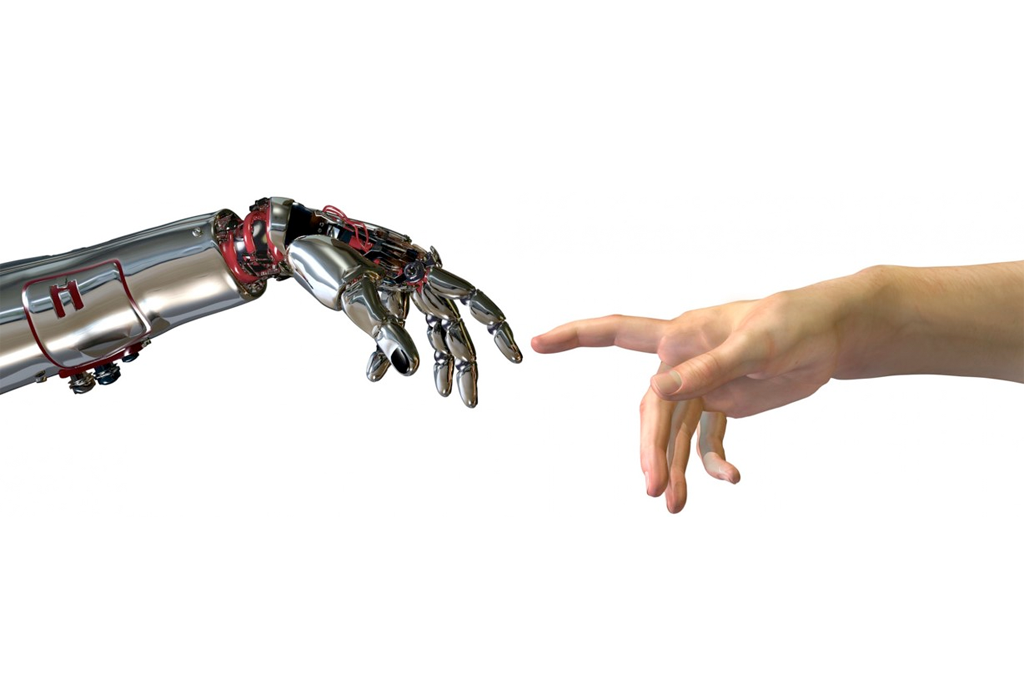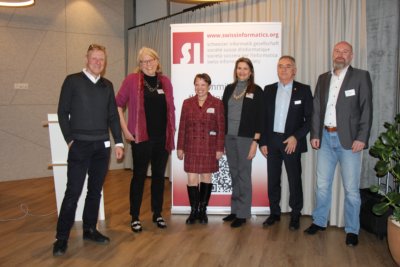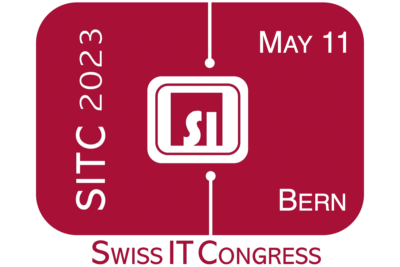Industry 4.0 was the topic at this year’s Küssnacht Business Forum. Fridel Rickenbacher, co-founder of the ICT company MIT-GROUP, spoke about the opportunities and risks of the digital future in his keynote speech “Industry 4.0 – Digitalization – Enlightenment 4.0”. Rickenbacher called for the opportunities of the future to be protected from the past, rather than the past from the future, because the intelligent combination of man and machine will make unprecedented things possible. Switzerland is a landlocked country with few raw materials, he said. That’s why we need to invest in digitization as quickly as possible. As a native of Küssnacht, he started his impulses with the fitting statement “It must also come through this hollow alley – digitization!” In the following interview, Fridel Rickenbacher provides in-depth insights into the digital future.
Question circles, interview and expert opinion, Ernst Sidler / Fridel Rickenbacher
Digitalization is said to be the age of job killers. How do you see that?
Fridel Rickenbacher: Indeed: technology “kills” or changes jobs, but only technology and digitalization can also save jobs. So far, the 2nd industrial revolution (electrification, mechanization, mass production around the year 1870) was statistically the biggest job killer and we hope and must, however, actively contribute to the “better together” that this remains so!
What about the “digital” fitness of Swiss SMEs, legislation and society as a basis for success in digitalization?
Fridel Rickenbacher: In my discussions and one of my interviews with the State Secretariat for Economic Affairs SECO, it was confirmed that the laws are in a relatively good and suitable condition in the context of the digitization tests. However, we all certainly need to take care that future consultations and laws do not banish the many innovations and our future abroad.Many companies in Switzerland have been struggling with automation and optimization for quite some time and now need to make further progress with the new developments of digitalization or Industry 4.0.
Where do we stand in the context of digitalization / Industry 4.0 from the perspective of cyber security and cloud technologies?
Fridel Rickenbacher: True innovation and further development at the strategic level can be optimized and in some cases even made possible if certain core operational processes and disciplines are operated in a highly standardized or highly specialized manner as supporting pillars, such as managed services in the specialist areas of ICT, security, software, clouds, or even better outsourced. Only then can you “think innovatively and act qualitatively” for new business models and transformation in a freer and less stressed way. This concentration on one’s own core competence and outsourcing of as many processes as possible that are not critical to one’s core competence in turn has positive side effects on, for example, one’s own risk management, auditing or compliance requirements.
You spoke of information competence and also challenge of the human being with artificial intelligence – appropriate to the level, however necessary at every age and stage of life – can this be achieved for very young and older people?
Fridel Rickenbacher: In the context of research and teaching (also Lehrplan21) and the further digitizing society, information competence will continue to gain relevance and prove further developments in international competition. Even increasing demographic challenges will be mitigated by digitalization and self-determination-optimizing
tools such as the Internet in general, apps, tablets, smartphones and especially by future developments in the areas of smart homes, IoT, data analytics, machine learning, artificial intelligence and above all “massive interconnection”.
It is foreseeable that companies still have some challenges and tasks to tackle in the topic of the “fight for talent” in order to find and retain the most suitable talents and best employees in the ongoing competition. What is your opinion on this?
Fridel Rickenbacher: Human capital will certainly continue to gain strategic importance. It is foreseeable that even the classic HR task areas will have to be massively expanded / specialized beyond personnel administration or even outsourced to data-supported “personnel recruitment” and even in the direction of highly specialized “personnel diagnostics” by experts with profound training and experience in HR knowledge, knowledge of human nature, diagnostics, data analyses and psychology. No company can afford the wrong people in the wrong positions in the near future.
Which human skills will remain in demand at all in the fight against / chance for the second age of machines and artificial intelligence?
Fridel Rickenbacher: In my head and veins “bits and bytes” flow, however, and therefore I am glad that there is not “only” artificial intelligence. I am convinced that it is above all the “soft skills” such as
z. e.g. empathy, human emotions, critical thinking, asking right questions remain unchanged one of our “last bastion”. Furthermore, I think that the artistic intelligence and imagination of us humans will be increasingly in demand and, in combination with machines, will enable completely new levels of complexity in finding solutions.
As members of the digital society, will we all live in fully digitalized smart cities at some point?
Fridel Rickenbacher: The “massive interconnection and data analytics” through Internet of Things (IoT), Big Data, Artificial Intelligence is supported by the fully integrated digitalization of planning and construction processes (Building Information Modeling BIM) will enable completely new, but also “fully analyzed” living and working spaces. Whether and how we can live and exist in such a “monitored and fully analyzed” way also depends on completely new rules of the game and, above all, on (information) ethical issues. We can only hope that a new kind of two-class society does not establish itself, in which some are the fully digitalized and fully analyzed onliners in the smart cities and the others are the voluntarily (or involuntarily) offliners outside the smart cities.
In various ongoing or active legislations around data protection, electronic identity and electronic patient dossier, there are great differences of opinion and discord. Where do you personally – as a member of these consultation expert groups – see particular challenges?
Fridel Rickenbacher: In short: If things go on like this, we will soon have to reclaim or otherwise regulate our basic personal rights to data sovereignty and at least maximized co-determination (right to copy / delete / suspend, privacy by default, etc.) over our data. Politics and legislation should not exert too great an influence on our opportunity for an internationalized digitalization economy at the expense of our otherwise even weakened, raw material-poor landlocked Switzerland.
You speak of Switzerland as a landlocked country, also in the aspect of Industry 4.0. According to you as a member / actor in the “National Strategy to Protect Switzerland from Cyber Risks”, surely these aspects are also being dealt with in the protection of critical infrastructures?
Fridel Rickenbacher: The importance of cyber security of such system-critical and sometimes latently threatened Swiss infrastructures as the backbone of the economy is self-evident and self-explanatory is self-evident and self-explanatory. However, it is imperative that this “homeland security” at the national level be aligned with international standards, certifications and cooperation.
Current and foreseeable further development and cross-border alliances in the necessary global fight against worldwide cybercrime, but also for the benefit of future new economy systems in the context of further digitization, require such strategies and, for example, such a “system of trust” among those cooperating.
- Digitization: The term digitization generally refers to the changes in processes, objects and events that occur with the increasing use of digital devices.
- Cyber security: Information security serves to protect against dangers or threats, to prevent economic damage and to minimize risks.
- Cloud technologies: Cloud computing describes the approach of making IT infrastructures available via a computer network without them having to be installed on the local computer.
need to be installed on the local computer. - Managed Services: Managed services are IT services provided by companies.
- ICT: ICT stands for information and communications technology.
- Compliance: In business jargon, compliance is the term for adherence to laws and guidelines.
- Smart Homes: This term covers both the networking of home technology and household appliances, as well as the networking of consumer electronics components.
- IoT: The term Internet of Things (IoT) describes the fact that the (personal) computer in the digital world is increasingly being supplemented by “intelligent objects ” up to and including artificial intelligence.
- Cybercrime: The term cybercrime covers all crimes that exploit electronic infrastructur.
_____
Fridel Rickenbacher is co-founder, partner, managing director and board member of MIT-GROUP, a total company for “Empowering for the 4th Industrial Revolution ” and information and communication management. He is also a member of various industry and professional associations, editorial boards and expert groups in the areas of cyber security, privacy, AI, eHealth, information ethics, digitalization of construction, training of Swiss certified IT experts and a member of the federal IT steering body “National Strategy for the Protection of Switzerland against Cyber Risks (NCS)”.










